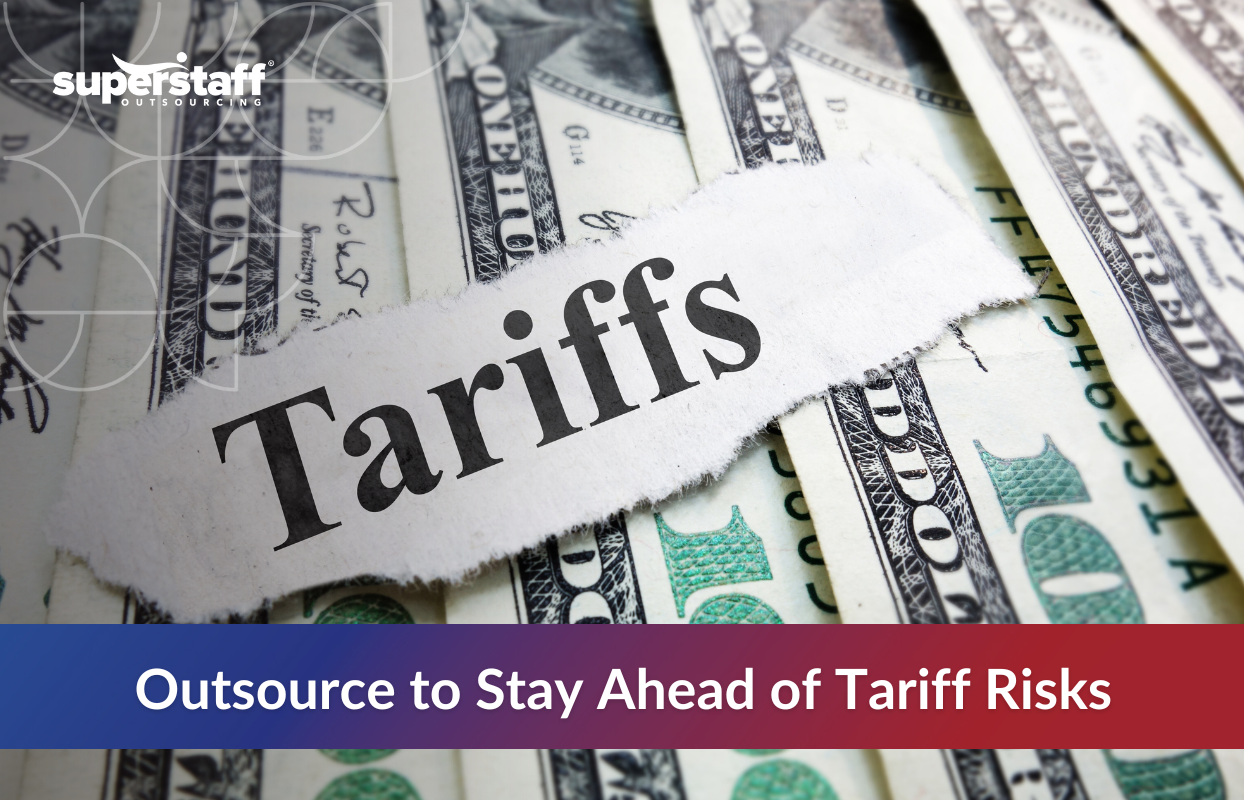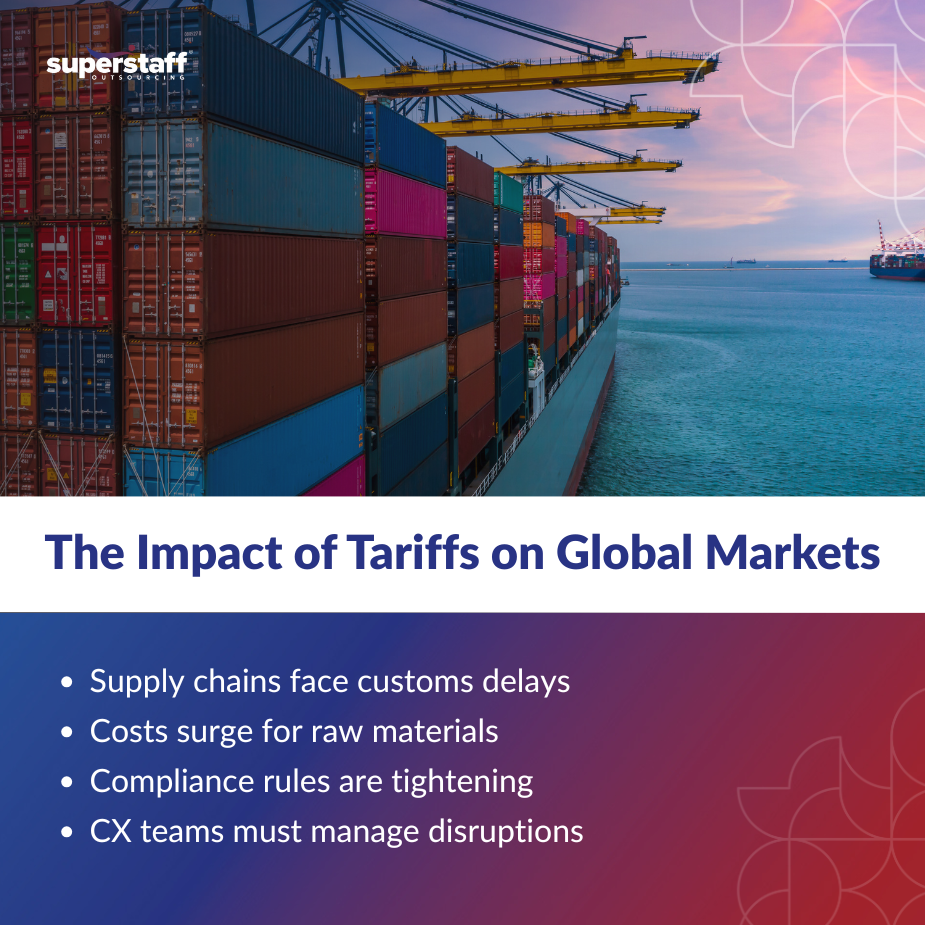
In 2025, tariffs are doing more than reshaping trade—they’re redrawing business strategy. Across industries, rising protectionist policies and shifting trade alliances are pressuring global supply chains and operational frameworks. Companies that import, export, or rely on globally sourced goods must now navigate an environment riddled with unpredictability.
The impact of tariffs on global markets has grown too significant to ignore. They are inflating costs, slowing down supply chains, and forcing C-suite leaders to rethink long-standing practices. This blog explores how today’s tariff policy changes are affecting operations worldwide—and how outsourcing critical functions can help global businesses stay cost-effective, compliant, and competitive.

Tariffs Are Reshaping Costs and Global Supply Chains
When a new round of tariffs hits, it doesn’t just raise prices—it sends ripple effects across supply chains. For many companies, the impact of tariffs on global markets is felt immediately in the form of increased costs for imported raw materials, parts, and finished goods. These added expenses throw off budgets and force unplanned revisions to product pricing.
What’s more, customs delays due to stricter enforcement and new documentation requirements extend lead times, further complicating supply planning. As regional sourcing grows more complex, businesses now face hard choices between cost, speed, and compliance. Some companies are beginning to diversify their sourcing strategies by exploring alternative countries, but this only adds more complexity to operations.
The impact of tariffs on global markets is especially pronounced in industries that rely on intricate supply chains across borders. And it’s not just manufacturing—financial markets are also reacting. According to Forbes, shares of Apple dropped 9% during the most recent tariff selloff, underscoring how deeply tariffs are unsettling global business performance, even for the most established players.
These disruptions are prompting companies to rethink not only what they source—but how they structure and operate globally.
Outsourcing Offers a Smart Path to Margin Protection
In the face of mounting costs, outsourcing provides immediate breathing room. By shifting non-core operations offshore, companies can rebalance financials and protect margins. Especially for SMEs and midmarket businesses, labor arbitrage—moving customer service, data processing, or administrative functions to countries like the Philippines—translates into substantial savings.
And this is where the impact of tariffs on global markets triggers a shift in strategy. Instead of absorbing higher costs or passing them to consumers, businesses can reallocate savings from outsourced operations to offset increased duties or sourcing expenses.
When internal resources are already stretched thin, outsourcing functions like compliance, procurement coordination, or order processing helps redirect focus to higher-value tasks. It also protects service quality when customer expectations are high. According to Zendesk, more than half of customers are likely to leave for a competitor after just one poor service experience—proving that dependable, high-quality support is essential to protecting revenue.
As tariff policy changes continue, outsourcing also helps companies remain agile. Need to scale up support for customs processing during high-volume months? That’s possible. Want to streamline during a quiet season? Offshore teams can flex with you.
This adaptability becomes a strategic edge, especially as the impact of tariffs on global markets remains volatile.
Logistics Outsourcing: Keeping Pace With New Trade Routes
Shifting trade policies are redrawing logistics maps. U.S.-Asia trade dynamics, Europe’s regulatory adjustments, and Latin America’s trade alignment efforts are all influencing where and how goods flow. As a result, logistics teams must constantly adjust shipping lanes, partner networks, and delivery timelines.
The impact of tariffs on global markets has exposed the fragility of traditional logistics models. Delays in customs processing, new documentation requirements, and evolving port policies all create barriers to smooth operations.
Outsourced logistics support brings a level of precision and responsiveness that’s hard to maintain in-house—especially for growing businesses. Track-and-trace agents stationed in the Philippines, for instance, can monitor shipments, flag exceptions, and coordinate delivery follow-ups with freight partners in real time.
Having a dedicated offshore logistics team also makes it easier to provide proof of delivery, update customers, and compile documentation that complies with both local and international requirements. As trade routes shift and new regulations emerge, the ability to respond quickly becomes a competitive necessity.
That’s why, with the impact of tariffs on global markets showing no signs of easing, logistics outsourcing is proving to be a long-term solution rather than a temporary fix.
Compliance Support Through Back-Office Outsourcing
Tariffs don’t just affect goods—they affect paperwork. For every new duty or trade restriction, there are corresponding changes to forms, systems, and regulatory expectations. And when you’re dealing with cross-border transactions, even small documentation errors can result in delays or penalties.
The impact of tariffs on global markets has made compliance more resource-intensive. Many companies are now expected to track multiple sets of trade rules, apply correct classifications, and ensure documentation is consistent across suppliers and jurisdictions.
This is where outsourcing back-office support makes a significant difference. Teams in offshore locations can be trained to handle trade documentation reviews, manage cross-border invoicing, and stay current with evolving tariff classifications. They can also help businesses monitor international regulatory changes and adapt processes accordingly.
Whether it’s updating internal systems or double-checking customs paperwork, these teams ensure nothing slips through the cracks. And because they operate across time zones, many offshore providers offer faster turnaround times—especially valuable when deadlines for submissions or customs checks are tight.
As the impact of tariffs on global markets increases the burden of compliance, back-office outsourcing becomes an essential part of the solution.
Consistent Customer Support During Trade Disruptions
Even the most efficient business can’t escape customer frustration when deliveries are delayed or prices shift unexpectedly. During trade disruptions, clear communication is essential—but many internal customer service teams aren’t equipped to handle the spike in volume or complexity.
The impact of tariffs on global markets often plays out at the customer service level. Buyers want answers. Distributors want updates. Partners expect reassurances.
Outsourced CX teams provide a safety net. With around-the-clock availability and the ability to handle inquiries across languages and regions, these teams allow businesses to maintain trust and transparency with stakeholders.
Instead of waiting until problems arise, some companies proactively update customers through outsourced channels. Whether it’s a message about shipping changes, a heads-up on new duties, or support in navigating post-sale issues, CX outsourcing keeps communication flowing.
Customer experience is one of the few areas where expectations haven’t softened—even during global disruptions. That’s why, amid the impact of tariffs on global markets, companies are prioritizing service continuity more than ever.
SuperStaff: Your Partner in Tariff-Ready Operations
SuperStaff understands the challenges of navigating today’s unpredictable trade landscape. With support hubs in the Philippines and Colombia, we help companies adapt to the impact of tariffs on global markets by offering flexible outsourcing solutions that improve operational efficiency and reduce costs.
From logistics coordination to back-office compliance and global customer support, our teams are trained to support your operations through every twist in trade policy. We don’t just offer manpower—we offer strategic partnership, continuity, and peace of mind.
Whether you’re shifting to new suppliers, adjusting documentation workflows, or simply trying to keep your customers informed, SuperStaff has the infrastructure, talent, and experience to support you. Our flexible staffing models allow you to scale fast, while our focus on operational excellence ensures long-term success.
We’ve helped businesses across industries find stability in the face of constant policy change. And as the impact of tariffs on global markets continues to evolve, we’re here to make sure your business stays ready, responsive, and resilient.
The Impact of Tariffs on Global Markets: Why Outsourcing Is the Way Forward
The current wave of tariffs is forcing global companies to make tough decisions. From rising input costs to delayed shipping and stricter documentation, the impact of tariffs on global markets is being felt in every corner of the supply chain.
But there is a way forward—and it begins with strategic outsourcing. Whether it’s offshore customer support, freight tracking, or regulatory compliance, outsourcing gives companies the flexibility and resilience to manage trade disruptions with confidence.
We’ve explored how the effect of supply chain issues on global commerce and tariff policy changes are upending business operations. And we’ve shown that understanding the economic consequences of tariffs on global commerce isn’t just about policy—it’s about preparation.
At SuperStaff, we help you prepare, respond, and grow through dedicated outsourcing solutions tailored to your global goals.
Ready to navigate the tariff tide? Let SuperStaff help you build global resilience through smarter outsourcing. Reach out to our team today to learn how we can support your business in a tariff-tested world.






